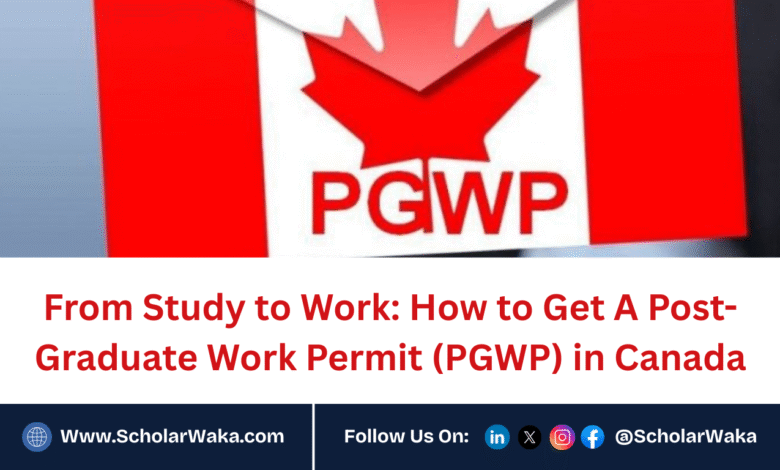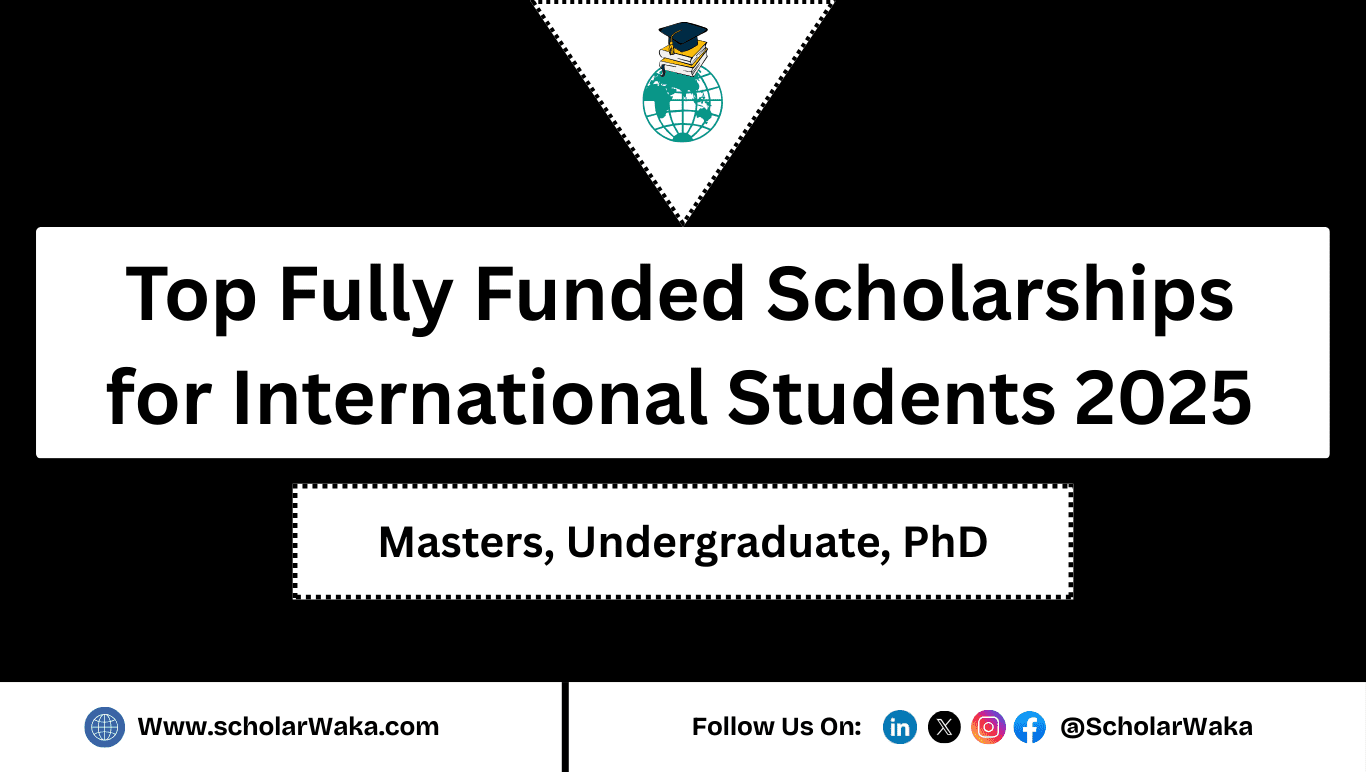From Study to Work: How to Get A Post-Graduate Work Permit (PGWP) in Canada

Obtaining a Post-Graduation Work Permit (PGWP) in Canada is a major achievement, as it enables international students to remain in the country, gain work experience, and possibly start the process of permanent residency. If you’ve been wondering how to get a Post-Graduate Work Permit (PGWP) in Canada, this should be your next target after graduation. While studying, your ability to work is tied strictly to your study permit. But here’s the catch: once your program ends, your study permit expires, meaning you’ll need a new valid option to stay. That’s where the PGWP comes in.
In this guide, we’ll walk you through everything you need to know: eligibility, how to apply, the required documents, and tips to avoid mistakes, so you can smoothly transition from being a student to building your career in Canada.
Scholarship Categories to Explore on ScholarWaka— Here are some key scholarship opportunities you should check out on ScholarWaka:
- Study Abroad: Study in USA | Study in Canada | Study in UK | Study in Europe | Study in Asia | Study in Australia | Study in Africa
- Scholarship Category: Undergraduate Scholarships | Postgraduate Scholarships | Masters Scholarships | PhD Scholarships | Competitions | High School Scholarships | Internships Scholarships | Training | Fellowships
What is a Post-Graduate Work Permit (PGWP)?
A Post-Graduation Work Permit, called PGWP, is an open work permit issued to international students who have completed a program of study at an eligible Canadian institution. This permit allows you to work for any employer in Canada, full-time or part-time, and in any occupation.
The Canadian government created the PGWP as a way to help graduates gain valuable Canadian work experience after school. Why is this important? Canadian work experience can open doors to permanent residency programs like the Express Entry or Provincial Nominee Programs (PNPs).
So, think of the PGWP as your bridge from being a student to becoming a professional in Canada. If you’re asking yourself how to get a Post-Graduate Work Permit (PGWP) in Canada, this is exactly why it matters. It supports your transition by giving you the freedom to work and settle, instead of having to leave immediately once your study permit expires.
Eligibility Requirements for How to Get A Post-Graduation Work Permit (PGWP) in Canada
Not every international student automatically qualifies for the PGWP. Your journey to live and work in Canada after graduation starts with understanding the eligibility requirements for the PGWP.
Here’s a breakdown of the key requirements:
- Completed an eligible program: You must have finished a program of at least 8 months at a Designated Learning Institution (DLI) in Canada. The program could lead to a degree, diploma, or certificate.
- Full-time student status: During your studies, you should have maintained full-time status in Canada.
- Valid study permit: Your study permit must have been valid at some point during your academic program.
- Applied within 180 days: You need to apply for your PGWP within 180 days (about 6 months) after receiving your transcript or official letter that confirms you completed your program.
- In-person studies: Most of your program should be completed in person, not entirely online.
If you meet all these conditions, then you’re likely eligible to apply for the PGWP.
Check out these related scholarship opportunities you may be interested in:
- University of Edinburgh Commonwealth Distance Learning Scholarships 2025 | How to Apply to a Fully Funded Study in the UK
- Leeds University Business School International Excellence Scholarships 2025/2026 in the UK | How to Apply
- University of British Columbia (UBC) Public Scholars Initiative (PSI) Award 2025/2026 in Canada | How to Apply
- 2025 University of Alberta Graduate Entrance Scholarship in Canada | Step-by-Step Process
- 2025 University of Manitoba Graduate Fellowship (UMGF) Scholarship in Canada
How to Apply for a Post-Graduation Work Permit (PGWP) in Canada
Applying for a PGWP might seem tricky at first, but it’s actually straightforward if you follow the steps carefully. If you’re wondering how to get a Post-Graduate Work Permit (PGWP) in Canada, here’s a clear breakdown to guide you:
- Check your eligibility
Before anything else, make sure you meet all the requirements we just discussed above. - Gather your documents
You’ll need:- Your transcript or official letter confirming you’ve completed your program.
- A valid passport (it should be valid for at least the length of the PGWP you’re applying for).
- Your study permit.
- Any other documents requested.
- How can you apply
You can apply online through the Immigration, Refugees and Citizenship Canada (IRCC) portal or on paper. Online applications are faster and more convenient. - Complete the application form
Fill out the work permit application carefully. Make sure all information matches your study documents. - Pay the application fee
A standard fee is made. Payment is done online when submitting your application. - Submit your application within 180 days
You must apply within 180 days after receiving your final transcript or official completion letter. Missing this deadline can make you ineligible. - Wait for IRCC processing
Processing times vary, but you can check updates online. Once approved, your PGWP will allow you to work in Canada full-time.
Alternatives to a Post-Graduation Work Permit (PGWP)
Not every international student in Canada may qualify for a Post-Graduation Work Permit. But that doesn’t mean your journey has to end once your studies are over. Here are some alternative pathways you can explore:
- Work Permits through Job Offers
If you secure a valid job offer from a Canadian employer, you may be able to apply for an employer-specific work permit. Some employers are willing to go through the Labour Market Impact Assessment (LMIA) process to support your application. - Provincial Nominee Programs (PNP)
Each province in Canada runs its own immigration programs to attract skilled workers. If you studied and lived in a province, applying through their PNP can give you a direct pathway to permanent residency. - Express Entry (Federal Skilled Worker Programs)
If you meet the eligibility requirements (language tests, skilled work experience, etc.), you can apply directly through Express Entry. Having a Canadian education already boosts your points in the Comprehensive Ranking System (CRS). - Continuing Studies
Some students choose to continue with another degree or diploma program, which may extend their stay in Canada and eventually make them eligible for PGWP or other immigration programs. - Spousal Open Work Permit
If your spouse or partner is studying or working in Canada, you might qualify for an open work permit based on their status.
NOTE: These alternatives not only keep you in Canada legally, but they can also serve as stepping stones toward permanent residency.
What You Need to Know About PGWP and Final Thought
Before you start your PGWP application, here are some key facts you should keep in mind:
- It’s a once-in-a-lifetime opportunity.
- The length of a PGWP depends on your study program..
- PGWP is an open work permit, which means you can work in any city, any company, and even switch jobs freely.
- It is a Pathway to permanent residency.
- Application deadline matters.
Getting a Post-Graduation Work Permit (PGWP) is one of the best steps you can take if you want to live and work in Canada after your studies. It gives you valuable Canadian work experience, allows you to build your career, and can even open the door to permanent residency.
Yes, the process can feel overwhelming, from checking eligibility to gathering documents and applying on time, but with the right information and preparation, it’s very doable.
I’ve seen many international students make this move successfully, and it really does open the door to a career and life in Canada. Yours can, too.
You’ve got this!
Here is an easy-to-follow guide for starting your scholarship application and crafting a compelling personal statement:
- How to Prepare A Scholarship Application – 5 Tips to Succeed
- How to Write a Personal Statement for Scholarship | Tips and Free Template
- Tips on How to Win a Scholarship
Confused About Where and How to Start Securing Scholarships Abroad:
- Top 10 LinkedIn Accounts to Follow for Scholarship Opportunities
- Step-by-Step Guide to Securing Scholarships Abroad for Beginners
Receive the Latest Scholarship Updates through our Social Media Channels:
- Twitter: @ScholarWaka
- Instagram: @ScholarWaka
- LinkedIn: @ScholarWaka
- Facebook: @ScholarWaka
- YouTube: @Lucy Ikpesu-Ewhubare









